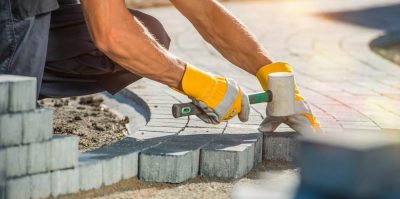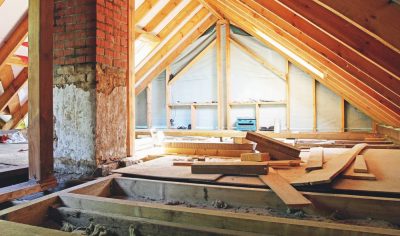- Oneflare /
- Cost Guides /
- Asphalt Driveway

How much does an asphalt driveway cost in Australia in 2025?
$35 - $45 per m2
What's on this page
- Asphalt driveway cost
- What is asphalt?
- Benefits of asphalt driveways
- Factors affecting asphalt driveway prices
- Tips for hiring an asphalt contractor
Read Related Asphalt Driveway Articles
How much does asphalt driveway cost?
Professional asphalt driveway installation ranges from $35–$45 per square metre, with premium finishes reaching $175 per m² or more.
Key takeaways
|
According to the Bureau of Infrastructure and Transport Research Economics (BITRE), Australia’s total estimated paved road length was 463,000 kilometres in 2023. Asphalt is the predominant surfacing material used on these paved roads, favoured for its durability and cost-effectiveness. This same durable material is increasingly becoming the top choice for residential driveways across the country.
Asphalt’s affordability, quick installation, and resilience to Australia’s harsh climate make it an attractive option for homeowners looking to enhance both function and kerb appeal. Understanding how much an asphalt driveway costs will help you budget effectively for this significant property upgrade.
How much does it cost to install a new asphalt driveway?
| Disclaimer: These prices are only estimated starting points for budgeting. Actual costs may vary based on specific project requirements and local market conditions. |
The cost of a new asphalt driveway in Australia varies significantly based on size and installation service complexity. As of 2025, most homeowners can expect to pay between $35 and $45 per square metre for standard installation, with premium finishes or complex projects reaching up to $100 per square metre.
An asphalt driveway cost calculator in Australia typically uses the data in our detailed breakdown of asphalt driveway costs:
| State/Territory | Cost per m² | Some considerations |
| New South Wales | $40–$70 | Higher in Sydney metro areas; coastal regions may require special materials |
| Victoria | $45–$60 | Melbourne prices trend higher; regional areas are more affordable |
| Queensland | $40–$65 | Additional UV protection often needed; higher in Brisbane and Gold Coast |
| Western Australia | $35–$50 | Most affordable mainland rates; higher transport costs in remote areas |
| South Australia | $38–$60 | Competitive pricing in Adelaide, varying rates in wine regions |
| Tasmania | $35–$60 | Higher transport costs impact material pricing |
| Northern Territory | $45–$60 | Cost of asphalt per square metre driven up by climate considerations and material transport |
| ACT | $45–$68 | Consistent pricing throughout the Canberra region |
What is Asphalt?
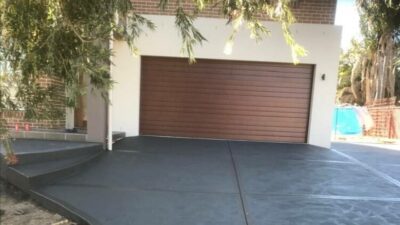
Freshly poured wide driveway | Source: Aus Design Concrete
Asphalt is a special mixture of aggregates containing fillers and binders that makes the final product, which is also known as bitumen. Asphalt is used for the construction of roads, parking lots, basketball courts, driveways, and more.
Some of the aggregates commonly found in asphalt mixtures include slags, gravel, sand or crushed rock. For the aggregates to bind into a cohesive mix, bitumen is utilised as a binder. Some call asphalt hot-top or blacktop. There are different types of asphalt applications, and they can be categorised by the mixing process used to bind the bitumen with the aggregate.
This combination creates robust asphalt for driveways that can withstand Australia’s varied climate conditions, from intense summer heat to winter rains.
What are the benefits of asphalt driveways?
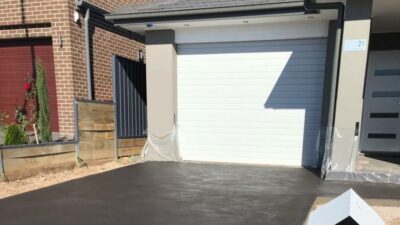
Compact driveway | Source: Symbol Constructions
Asphalt driveways offer several practical advantages that make them a popular choice for Australian homeowners:
Weather resistance
Asphalt driveways excel in adapting to Australia’s diverse climate conditions. The material expands and contracts with temperature changes without cracking, making it particularly suitable for areas with extreme temperature variations.
Quick installation
Unlike concrete, which can take up to a week to cure, asphalt driveways are usually ready for use 24–72 hours after installation. This rapid turnaround minimises disruption to your daily routine.
That said, concrete professionals insist that concrete driveways last longer, even with their longer curing time and more demanding installation.
Cost-effective maintenance
While regular maintenance is necessary, asphalt repairs are typically straightforward and affordable. Small cracks and damage can be easily patched. Also, unlike concrete resurfacing, asphalt resurfacing costs significantly less than a full concrete driveway replacement.
In addition, asphalt driveways are easier to clean, thanks to their naturally darker colour, which makes stains harder to spot.
Local handymen can be excellent resources for basic maintenance and minor repairs. Look into your local directory of handyman professionals who can help with routine upkeep and small fixes, saving driveway contractors for major work.
Sustainability
Modern asphalt mixtures often incorporate recycled materials, making them an environmentally conscious choice. Many Australian contractors now use eco-friendly warm mix asphalt that requires less energy during installation.
Increased property value
A well-finished driveway is one of the first things potential buyers notice. Combined with other exterior improvements like freshly painted garage doors and secure driveway gates, it can significantly boost your property’s overall value.
What are the factors affecting asphalt driveway prices?
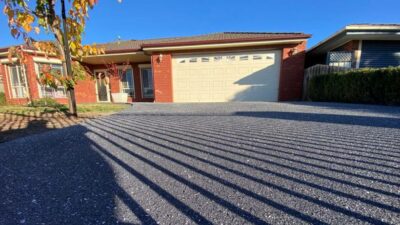
Spacious asphalt driveway | Source: Highend Concrete Resurfacing
From site preparation and soil conditions to material quality and location, several key factors influence the final cost of your asphalt driveway installation. Here’s what affects your bottom line.
Location and accessibility
Location and accessibility play a major role in determining asphalt driveway costs. Transportation costs for materials and equipment will be higher for properties located in remote areas. If your site is difficult to access, such as a steep incline or limited vehicle entry, it may require specialised machinery or extra labour, further increasing costs.
Local availability of materials also affects pricing, as limited supply in certain regions can drive prices up.
Types of asphalt
Different asphalt types suit different needs:
| Type | Cost per m² | Best for |
| Hot mix | $35-$45 | High-traffic areas, durability |
| Warm mix | $25-$40 | Eco-friendly option, moderate traffic |
| Cold mix | $10-$20 | Repairs, temporary surfaces |
| Premium mixes | $100-$175 | Decorative finishes, special requirements |
Some contractors use crushed asphalt for a more eco-friendly solution. The cost of a crushed asphalt driveway may be more reasonable, as it’s mostly recycled asphalt.
Driveway size and installation service complexity
Asphalt and bitumen driveways costs typically range from $35 to $45 per square metre, depending on several variables.
Costs scale with size, but not always linearly. For example, a typical single-car driveway measuring 30m² might cost between $750 and $3,000, while a larger double- or triple-car driveway could range from $4,000 to $10,000 or more. These asphalt prices include standard site preparation, base material, and asphalt laying. Here’s a detailed breakdown of the standard asphalt driveway cost per m2 you can expect to pay:
| Driveway size | Typical dimensions | Average cost range | Common applications |
| Small (30m² or less) | 3m x 10m | $750 – $3,000 | Single car, straight driveway |
| Medium (30-60m²) | 4m x 15m | $1,500 – $5,100 | Double car, simple curves |
| Large (60-100m²) | 6m x 15m | $2,500 – $8,500 | Triple car, circular design |
| Extra large (100m² or more) | 8m x 15m+ | $4,000 – $10,000+ | Multiple car spaces, complex designs |
Site preparation and excavation
The ground beneath your driveway matters as much as the asphalt itself. Proper site preparation affects your initial costs and determines the long-term durability of your driveway.
- Excavation: Standard excavation involves removing 200–300mm of existing material to create a solid foundation. These costs depend on soil type and access conditions. Disposing of excavated materials costs between $60 to $120 per cubic metre.
- Landscaping: Tree root systems near the driveway area may need barriers ($200 to $500). Gardens, retaining walls, and irrigation systems along the planned route often require protection or relocation.
- Surface type: Converting dirt or gravel is straightforward, but removing concrete adds $20 to $30 per square metre to your total costs. Existing damaged asphalt needs assessment for potential resurfacing, while brick or paver removal costs $20 to $35 per square metre.
- Drainage: Good drainage is essential to prevent pooling and long-term structural damage to your asphalt driveway. Your contractor should create a surface with at least a 1:100 fall away from structures. Some properties need drainage channels ($80 to $150 per linear metre) or soakwells ($750 to $1,500) to manage water runoff.
- Permits: When installing a brand new driveway or altering one, especially where it meets the street or footpath, you’ll likely need local council approval. This is because the section of driveway crossing the nature strip is council-controlled land. Most Australian councils require a driveway or vehicular crossover permit to ensure the work meets their standards. Application fees range from $200 to $500.
Tips for hiring an asphalt contractor
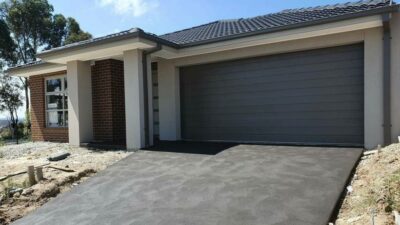
Newly completed driveway Source: Surfside Concreting & Landscaping
Selecting a qualified contractor directly impacts your driveway’s quality and longevity. Focus on these key criteria when making your decision:
Verify credentials and experience
Ask to see the contractor’s licence and verify it through your state’s licencing authority. Public liability insurance is equally important; this protects you if anything goes wrong during installation.
You can also request references from their recent local projects. A professional contractor should be happy to provide contact details for previous clients or show you examples of their work in your area. Pay special attention to the driveways they installed several years ago, as this will give you a better idea of how their work holds up over time.
Understanding quotes and contracts
A detailed quote is a sign of professionalism. Reputable contractors will provide itemised estimates outlining all project components, not just the asphalt cost per m2.
This should include:
- Material costs and quantities
- Labour charges
- Site preparation work
- Any necessary permits or council applications
- Expected timeline for completion
- Warranty terms and conditions
In addition, experienced contractors typically offer warranties ranging from 2 to 5 years, but the terms can vary significantly. Understand exactly what’s covered and what might void the warranty.
Evaluating service quality
The overall value of the service should be your primary consideration. Experienced contractors might charge more but often deliver superior results that save money in the long run. Look for:
- A solid track record with similar local projects
- Familiarity with regional conditions and regulations
- Clear, professional communication
- A suggested maintenance and aftercare plan
- Use of high-quality materials and up-to-date installation methods
Verify technical expertise
Finally, ask potential contractors these questions to gauge their experience and technical understanding:
- What depth of base course do they recommend for your soil type? Most experts suggest 100-150mm or 4-6 inches for residential driveways.
- What asphalt mix design will they use? The mix design should be appropriate for the intended layer thickness.
- How will they ensure proper drainage? Your place might present challenges that they’ve never encountered before.
- What compaction method will they use? A mechanical, vibratory roller is better than a plate compactor, for instance.
Your path to the perfect asphalt driveway
Your asphalt driveway represents both a practical necessity and a smart investment. The right materials and installation ensure decades of reliable service while enhancing your property’s value. In addition, asphalt’s durability and low maintenance make it a cost-effective choice for many homeowners.
Start your driveway transformation today by connecting with qualified local builders. A well-installed asphalt driveway that will last for years, even decades, awaits.
